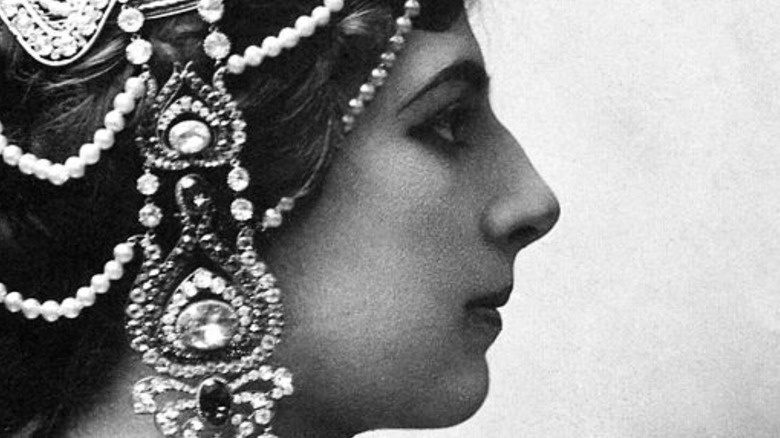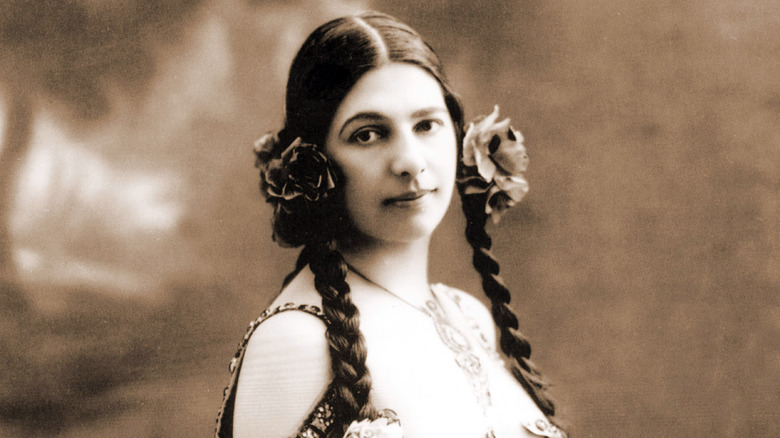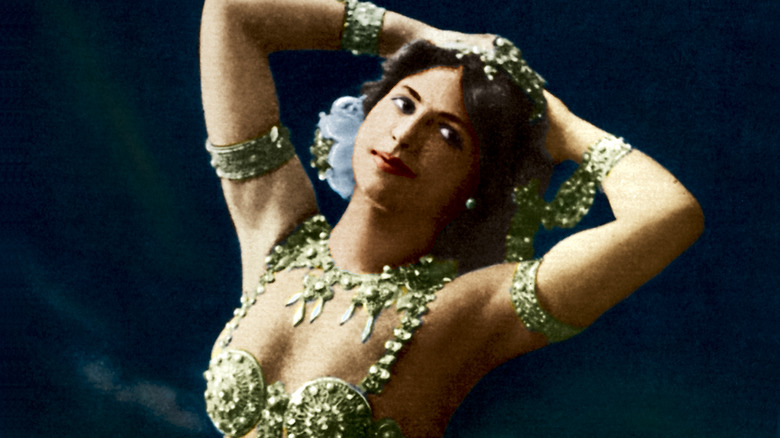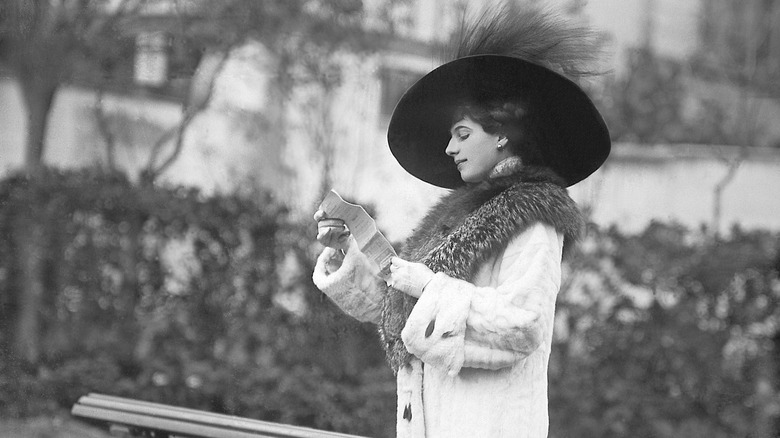The Conspiracy Theory That Claims Mata Hari Might Have Been Innocent
Sometimes referred to as the real-life inspiration for the fictional spy James Bond, Mata Hari is widely known as a sexy, cunning spy from the 1800s (via BBC). Using her good looks and charm, she is said by some to have gained secret information from her targets. Except for those historians who say Mata Hari may not have really been spying at all.
Mata Hari, originally named Margaretha Zelle, was born in the Netherlands in 1876 (via Britannica). She grew up with her parents, who later divorced, but her mother died when Hari was just a teenager (per BBC). Hari reportedly went to live with other family members. She then went to college, where rumor had it that she was in a sexual relationship with the school's headmaster, and these rumors got her kicked out of school. Seeking a new support system, she began to correspond with men through newspaper ads. This led her to her first marriage.
A new name
Britannica reports that in 1895, she married a Dutch army captain named Rudolph MacLeod, and spent a few years traveling in Indonesia with him. He was both verbally and physically abusive, by all reports. In the early 1900s, the couple returned to Europe. They divorced in 1902 (via BBC). After the separation, Hari became a dancer, using the stage name "Lady MacLeod." She later chose a new name, "Mata Hari," which translates to "eye of the day" or "sunrise," a fitting name for a woman who was, by all accounts, extremely beautiful (via Biography).
After changing her name, she started telling people that she was born and raised in Java, Indonesia, sometimes saying that she hailed from a family of Indian temple dancers. This also allowed her to perform scandalous dance routines under the guise of religious dances, gaining scores of new fans. Besides her dancing, Hari also became the mistress of numerous wealthy men.
Hari's spying career begins
Hari's fate changed in 1915, when she was approached by a German diplomat near The Hague (per Biography). He had a tempting offer: He asked Hari to become a spy for Germany, for the equivalent of $61,000 in today's money. Per Britannica, the diplomat told her to collect any information she could while on her next trip to France. But Hari only told the Germans outdated information.
In 1916, Hari married again, this time to Vladimir de Massloff, a member of the Russian army (per Biography). When de Massloff was hurt in battle, Hari rushed to see him. But she was stopped by War Department Officials. They offered her some much-needed money in order to become a spy for the French. Hari took the money without disclosing that she was already a spy for the Germans, officially becoming a double agent. Did she mean to, or was it accidental, the act of someone too naive to know what she had done? Per BBC, they thought Hari would be a good spy since she knew multiple languages, had tons of connections, and since she was an exotic dancer, she would not be suspected of being a spy.
Switching sides
Historians debate this, but it seems that Hari was basically just not a very good spy (via BBC). Some historians wonder if she even knew what she was getting herself into — maybe she simply thought she could act her way out of trouble like usual. She didn't try to hide her new connections from the Germans. Hari called Georges Ladoux, a French counterespionage bureau chief, at his office all the time. She sent him frequent unencrypted telegraphs, and mailed him letters through ordinary channels. And at this point in her life, Hari had reached local celebrity status, so she was recognized everywhere she went. She didn't seem to be doing much spying at all, and she was certainly not keeping a low profile.
TIME reports that the man responsible for Hari's downfall was probably Major Arnold Kalle of the German army. He began to distrust her, and thought she was either a distraction or was no longer necessary to the operations — perhaps even a liability. Using a code he knew the French had already cracked, Kalle identified Hari as a double agent. Mata Hari was found at a luxurious hotel, and was arrested by the French in February 1917.
Hari's trial and death
Per Britannica, Hari was imprisoned by the French in February 1917. Just months later, on July 24 and 25, she was sent to trial. The military court condemned Hari to death by firing squad. The Washington Post relates that on the day of her execution, Hari wrote two final letters, put on high heels and a fur-lined velvet cloak, and stood in front of a dozen French military officers. She refused a blindfold and reportedly blew a kiss at her executors before they fired at her. She was 41 years old at the time of her death.
So how exactly could Mata Hari have been innocent of her crimes? Some compelling evidence — or lack thereof — suggests this femme fatale may not have supplied any actual secrets. TIME reports that there is no evidence that Hari provided any useful military information to either side. Biography says that when Hari was paid $61,000 in 1915, she didn't actually use the money to spy. Instead, she claimed that the money was reimbursement for personal items that had been confiscated from her by German troops at the start of the war.
Was she actually a spy?
The French counterespionage chief had put Mata Hari under surveillance to see if she was a spy, but he never found any evidence to prove it. Per TIME, this new information suggests that Hari was actually a just scapegoat for the French army. Morale was so low that some units were beginning to mutiny. Apparently, Hari was a good choice to pin the blame on because she had slept with men from both sides of the war.
Naturally, conspiracies swirled soon after her death. Some soldiers claimed that the execution was staged — the firing squad used blanks, and she was still alive somewhere (via TIME). But in reality, Hari's remains were donated to medical students in Paris. Her legacy remained long after she perished, inspiring a Greta Garbo movie in the 1930s titled "Mata Hari" (via IMDb). She was a character in the 1967 comedy "Casino Royale," where she seduces James Bond, and they have a daughter together named Mata Bond (via IMDb). On the other hand, her long-lasting legacy — her myth — has no doubt influenced subsequent tales of charming, seductive spies from around the globe.





